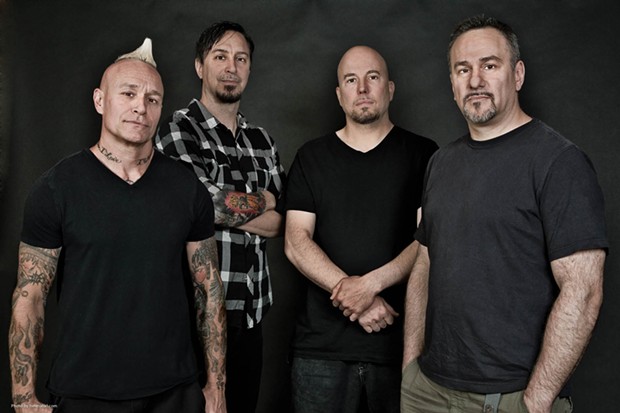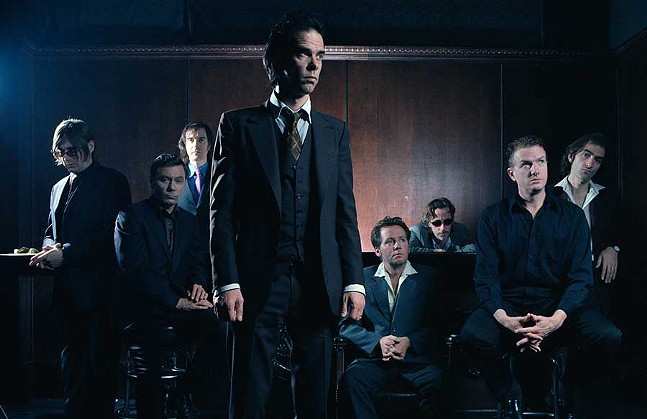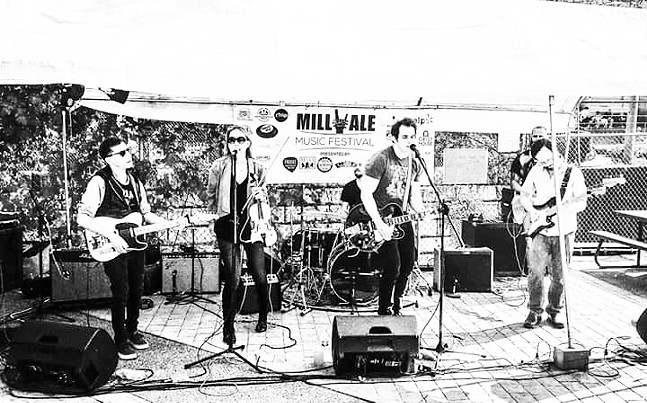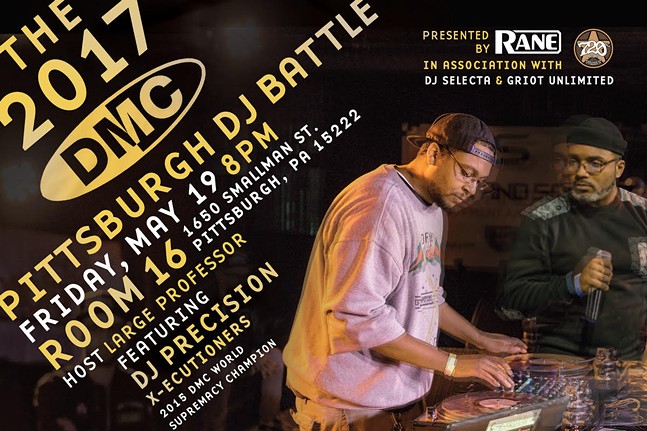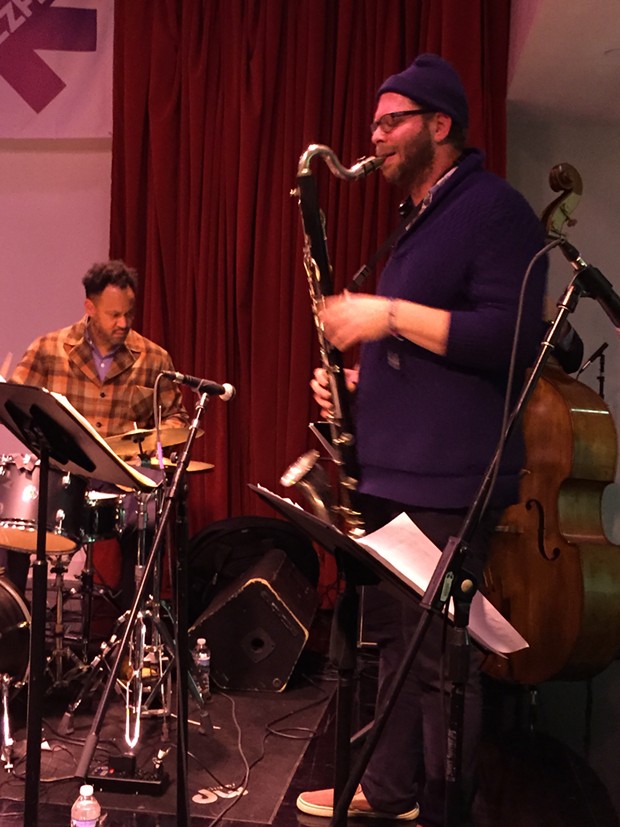Friday, November 3, 2017
Six amazing bands came to Jergel's Rhythm Grille on Nov. 2 looking to be crowned champion of the inaugural Pittsburgh City Paper and Drusky Entertainment's Face the Music Battle of the Bands contest.
But when the amps stopped shaking, Chase and the Barons were selected by the judges as the Critics' Choice award-winner. The band won a prize package consisting of $2,000 cash, a CP cover story, an opening set for a Drusky Entertainment show, 75 band shirts printed with the band logo, a Pittsburgh City Paper advertising package valued at $1,500 and 24 hours of recording time at Tonic. The band opened the show, and its set was good enough and memorable enough to fight off the competition.
Tags: Pittsburgh , Pittsburgh Music , Face the Music , Battle of the Bands , Jergel's , Jergel's Rhythm Grille , Chase and the Barons , Kaelber , Dash City Skyline , Honey , Jeff Fetterman Band , Sourmash , Drusky Entertainment , Tito's Vodka , Iron City Beer , Image
Friday, October 13, 2017
Can a city have too many music festivals? Unless you're a crusty curmudgeon, no, not really. Music, food, neighbors and sunshine are generally agreed on to be cool, good things.
Pittsburgh in 2017 is pretty stacked in this department, with festivals of varying sizes and personalities running throughout the year. Some are dedicated to neighborhoods, some to genres, and some to philanthropy. Joining the scene this year is Le Creme, a day-long music festival in Allentown, founded by the owner of Supermonkey Recording Co., Christian Groblewski. The iconic rock band Living Colour is headlining, but there's a robust bill of local (mostly rock) acts filling out the day, including Joe Grushecky & The Houserockers and Venus in Furs.
For a little background on how Le Creme came to be, read City Paper's Q&A with Groblewski.
Tags: Le Creme , Living Colour , Christian Groblewski , Supermonkey Recording Co , Allentown , FFW>> , Image
Wednesday, July 19, 2017
Sick of It All has been taking the hardcore scene by storm since its inception in 1986. Twenty years since its last Warped Tour, the group sat down with CP to chat about how the scene has changed, what it’s like to tour with a family at home and why playing Europe is so damn cool.
Tags: Sick of It All , Warped Tour , Pete Koller , Hard Rock , Lou Koller , Bad Cop Bad Cop , FFW>> , Image
Monday, June 26, 2017
Tags: What Cheer Brigade , Dan Schleifer , Jayvan Tarver , You Can’t See Inside Of Me , Don Giovanni Records , FFW>> , Image
Wednesday, June 7, 2017
“I come from a different school of frontmen. Full-on attack,” Nick Cave says in a recent interview in GQ.
“It's an attack on your audience of some sort. It's just the way it's always been.”
Tags: Nick Cave , Bad Seeds , One More Time with Feeling , FFW>> , Image , Video
Tuesday, June 6, 2017
The album art for Devin Moses and the Saved's album release show features a group drawing, like a psychedelic class photo, of people who have helped the band along the way. There’s people like Mary Jo Coll from Howlers, and the organizer of the Deutschtown Music Festival. Like any good class photo, there are also a bunch of misfits, like the model Iman, comedian Duncan Trussell, and the devil. And like their album art, The Saved is a hodgepodge of genre and inspiration.
Tags: Devin Moses , The Saved , Derek January , James Street Gastropub , FFW>> , Image , Video
Thursday, May 18, 2017
Tomorrow, Pittsburgh will host a Disco Mix Club DJ Battle for the first time in the competition's history, which began in 1985. The group's website touts DMC competitions as "the World's Number 1 DJ Competition," drawing contestants from around the globe. The Pittsburgh event alone has contestants from at least 10 states, including Arizona, Georgia and New York.
According to DJ Selecta, one of the event's promoters and host of 91.3 FM WYEP's Grand Groove Radio, the average DJ battle has between 10 and 12 contestants. The Pittsburgh event will have 19. Selecta called the event "uncharted territory," noting that while Pittsburgh has held DJ battles before, such as the Red Bull Thre3style competition in 2015, DMC’s battles are a different experience. "Those battles are more based on crowd participation, as opposed to this one, which is based on scratching skills," says Selecta.
The competition takes place at Room 16, a Strip District club.
Tags: DMC DJ Battles , Christie Z , DJ Selecta , Room 16 , FFW>> , Image
Wednesday, February 1, 2017
Tags: All Dogs , Leo Kottke , Girlpool , Keller Williams , Spacefish , DK Anderson's Cypher , The Afterglows , Try the Pie , Steve 'n' Seagulls , Lacey Sturm , FFW>>
Tuesday, January 31, 2017
“6 Days. Over 150 Jazz Groups. 600+ Musicians,” declares the program for the 13th Annual NYC Winter Jazzfest, which took place in New York City Jan. 5-10.
And yet some knuckleheads feel the need to ponder whether or not jazz is dead. After a weekend traipsing around Manhattan, my feet might not be alive and well, but the music is.
This year, music wasn’t the only thing served up in the festival. Issues of racial and social justice threaded through the performances, from specific pieces that addressed them to a panel discussion titled “Social Justice and the Role of Music,” which featured musicians and representatives from the American Civil Liberties Union and Black Lives Matter. Between sets at virtually every performance space, slides of festival performers were projected onstage, with quotes from each musician expressing solidarity. The boldest examples of jazz have always held these issues at arm’s length, which makes perfect sense since the music is built on the concept of group interaction and discussed with terms like “communication,” “expression” and “freedom."
While the weekend included myriad sets at a number of performance spaces, Thursday night featured just a couple of kick-off events. That means everyone clamored to get into (Le) Poisson Rouge to see veteran saxophonist Pharoah Sanders, leaving yours truly out in the cold. Tickets to the Jazz Concert for Disability Pride proved a little too costly, but The Stone offered a cheaper alternative (albeit one not affiliated with the festival). Situated on the Lower East Side, and virtually nothing more than a room with folding chairs and good acoustics, the John Zorn-directed Stone featured a week-long residency by drummer Jerry Granelli. Celebrating “76 years on the planet and 60 years of performance of improvised music,” Granelli lead a quartet with Jane Ira Bloom (soprano saxophone), Dave Douglas (trumpet) and Mark Dresser (bass) through a rambunctious set of originals and a spritely Ornette Coleman cover. For all his 76 years, Granelli played with the fury and enthusiasm of someone a third his age. “You’re a brave man,” Bloom told me, as I took one of the few remaining seats at the 9 p.m. show, adjacent to a music stand used by Douglas, who stood less than five feet from me during the hour-long performance.
Friday evening, with the Jazz Connect Conference wrapped up, it was time to secure the all-access wristband at the New School Tishman Auditorium, at Fifth Avenue and 13th Street; several of the performances took place within a two-block radius. In the building’s auditorium, the final moments of Craig Harris’ ensemble Breathe started the weekend off on a high note. Or notes, actually. There’s nothing as joyous as the sound of a 40-piece ensemble collectively wailing together over a polyrhythmic groove. Thelonious Monk used to talk about “lifting the bandstand” during a performance. The power of Breathe’s sound could have lifted the whole block.
After that, a two-piece might have seemed anti-climactic. But since half the duo was NYCWJF artist-in-residence Andrew Cyrille, that was not the case. A drummer who seems to be experiencing a career renaissance that eclipses his important tenure with pianist Cecil Taylor in the ’60s, Cyrille paired up with tenor saxophonist Bill McHenry for a sparse but engaging set that included folky melodies (“Drum Song for Leadbelly”), a Monk classic (“Epistrophy”) and a more avant piece (“Drum Man Cyrille”), in which Cyrille’s bass drum sounded like a droning note. Cyrille played three more times with as many groups during the festival, but unfortunately his other sets conflicted with other must-see acts.
Around the corner at the New School’s 12th Street Auditorium, tenor saxophonist Melissa Aldana expanded her usual tenor/bass/drums trio to a sextet, adding piano, vibes and trumpet. The Chilean native, who won the Thelonious Monk International Saxophone Competition in 2013, continues to be one of the instrument’s most impressive soloists. The moods in her set recalled 1960s-era Miles Davis, but everything felt more involved, from the writing to the solos. Aldana and her bandmates had the look of conservatory students (Aldana is 28), but they countered that vision with a full-blown maturity in their playing.
Earlier in the evening, there had been no room in the Glass Box Theater to see trumpeter Jonathan Finlayson, so I wasn’t going to take any chances on missing Mike Reed’s Flesh & Bone, who were set to play in the same intimate space immediately following Aldana. Reed, a drummer from Chicago, who has also done a lot to support original music in that city, brought a sextet that included bass clarinetist (and half-brother of comedian Amy Schumer) Jason Stein and alto saxophonist Greg Ward, both of whom released some of 2016’s best jazz albums under their own names. Reed’s music moves like a modern, turbo-charged version of Charles Mingus. The drummer and bassist Jason Roebke held down the fort, while the horns took off in whatever direction the mood required. Marvin Tate took things even deeper with spoken-word interludes that captured the social-political concerns of the festival. While these kinds of verbal breaks can occasionally bog down such a performance, I found myself wanting to hear more of Tate’s impassioned delivery. When this band releases an album, buy it. Better yet, buy two.
Between the closing roar of Craig Harris’ ensemble and Reed’s unflagging intensity, that might have been enough. But the night was still young. And drummer Jim Black was playing a few flights up from the Glass Box in the obviously named 5th Floor Theater. Last year, he set up shop in the same place with a piano trio. Tonight, pianist Elias Stemeser traded the 88s for an overdriven synthesizer. Chris Tordini moved from upright to bass guitar, and tenor saxophonist Loftur Gudmundsson proved to be a great partner-in-arms to Stemeser. Black, whose newest batch of songs combined anthemic riffs with free blowing, never ceases to astound, always utilizing every part of his drum kit, including the two crash cymbals that look broken or cut in half.
The city supposedly never sleeps, so I saw no reason to either. Onto the M train to the Village — Bleeker Street to be exact — where tenor saxophone quartet Battle Trance was in the middle of an extensive performance at Subculture. Purists might recoil at the sounds these guys create, but for more than half an hour, they roared out ugly overtones, sang through their mouthpieces like choir boys, screeched out harmonics and — when things seems the loosest — magically came together on a low squonk. Don’t miss them when they come to Pittsburgh in the coming months.
Saturday began where Friday night ended for me. Back at Subculture, trumpeter Peter Evans (once a member of the wild and zany quartet Mostly Other People Do the Killing) was finishing up a set marked by extended technique on his horn, filtered through samplers and keyboards by his bandmates.
Pianist Kris Davis followed, performing with three collaborators who appeared on her recent set of duets, Duopoly. While that album had some intriguing moments, seeing the interactions unfold onstage gave it extra life. Billy Drummond joined her for Monk’s “Eronel,” playing so sparsely at first that a patron’s footsteps in Subculture were more audible than him or Davis. Angelica Sanchez joined her next, taking the piano while Davis shifted to electric piano. The two of them carefully divided duties in solos and chord changes, resulting in some delightfully angular poking and pounding. When alto saxophonist Tim Berne had his turn with Davis, her accompaniment in the upper register sounded like shattering glass, and led to a performance with more energy than their studio outing.
The Tishman Auditorium was filled to the rafters with eager listeners ready for various artists on the ECM label, which began in Germany 48 years ago and continues to release a wealth of jazz and classical releases. Saxophonist Ravi Coltrane and pianist David Virelles haven’t released an album for the imprint together, although the latter now has dabbled in his own version of world music on two discs for them so far. Still they made a strong pairing in the auditorium. Playing tenor, soprano and sopranino saxophones, Coltrane often played with a lithe tone that would fit in well on ECM and made a good contrast to Virelles’ heavier attack. The saxophonist never uses his late, iconic father (John Coltrane) to elevate his own status, but he’s also not averse to digging into material from his father’s legacy. His brief version of “Monk’s Mood,” the deep cut Thelonious Monk ballad, went way out of tempo, much like Dad did with the composer at Carnegie Hall in 1957. Later, Coltrane donned his sopranino (a horn rarely heard outside of more avant-garde situations) for a slow, methodical take on “Lush Life,” the ballad Billy Strayhorn wrote while still living in Pittsburgh.
This makes me sound like a real tourist, but I couldn’t help but think that SOB’s takes its name not as an abbreviation of “Sounds of Brazil” but due to the fact that they charge $12 for a mixed drink served in a plastic cup. On the other hand, since no booze was sold at any of the New School venues, and since the roughly 8-ounce drink produced a great buzz, it was worth it. The real reason to travel to SOB’s was Marc Ribot’s Young Philadelphians were putting their harmolodic spin on some classic (albeit slightly cheesy) ’70s R&B hits. Last year, I slightly disparaged the band’s Live in Tokyo disc due to the lackadaisical vocals bringing down an otherwise solid performance by two of the most ingenious guitarists in modern rock or jazz (Ribot, Mary Halvorson) and a funky rhythm section that has close connections to both genuine funk and Ornette Coleman’s harmolodic approach (bassist Jamaaladeen Tacuma, drummer G. Calvin Weston). In person, the vocals were mere trimmings to a wild re-imagining of tunes like “Fly Robin Fly” and “The Hustle.” The quartet definitely elevates them to levels that Silver Convention and Van McCoy never imagined when they first recorded them.
In keeping with the modern twist on things, my Winter JazzFest ended back at the 5th Floor Theater with TALIBAM! HARD VIBE. Drummer Kevin Shea (another member of Mostly Other People Do the Killing, who once lived in Pittsburgh) and keyboardist Matt Mottel have been blowing listeners' ears away with their irreverent, free improvisation in TALIBAM for several years. Adding MOPDtK’s Ron Stabinsky on additional keyboards and Matt Nelson on tenor “a-xophone” (essentially a tenor with electronics attached to it), they band rocked hard on an extended piece. Quite honestly, their set is now a blur not because of the performance but because by that point in the evening, I was spent. Shea slipped me a copy of their upcoming disc on the legendary ESP imprint, which will help me relive the evening though.
The one regret of the trip was missing the Liberation Music Orchestra, which played Tuesday night, two days after I returned home. The late bassist Charlie Haden first launched the ensemble in 1969, playing politically charged music “dedicated to creating a better world … where men of all governments realize the vital importance of life and strive to protect rather than destroy it.” Even with Haden’s passing in 2014, the Orchestra lives on, in this case with the University of Pittsburgh’s Geri Allen leading it. Maybe she’ll bring it to town someday.
Tags: Winter Jazzfest , Pharoah Sanders , Jerry Granelli , Jane Ira Bloom , Jazz Connect Conference , Breathe , Andrew Cyrille , Melissa Aldana , Mike Reed’s Flesh & Bone , Jonathan Finlayson , Jason Stein , Greg Ward , Elias Stemeser , Chris Tordini , Loftur Gudmundsson , Battle Trance , Billy Drummond , Ravi Coltrane , David Virelles , Marc Ribot’s New Young Philadelphians , FFW>> , Image
Thursday, December 29, 2016
2016 was Frobert’s last year on earth, but it was also among his most prolific. This year, the local outsider-folk auteur Frank Austin was featured in Vice and Pitchfork for his single “Don’t Smell My Coffin”; he finally broke into the college radio top ten with his 16th solo effort Frobsolescent; and Austin made his (much maligned) debut on Last Call With Carson Daly (spawning the famous “For shame, Carson!” meme). True to his curmudgeonly reputation, Austin maintained his moratorium on Pittsburgh media in 2016, which began 1990 when a young reporter from the Pittsburgh Press asked why he recorded solely on tape. His response: “Because tape is what I have!” Austin has never been confused for an amiable personality, but his music did the talking for him. Songs like “Crafton,” “Phone Bill” and “Let’s Make It Up” show that while some of his output was hard to swallow, at his core Austin was a brilliant, soulful songwriter capable of profound beauty. After 40+ years in the business — first with the seminal art-rock outfit JK Applesauce, and then with the lo-fi punk legends Toosh — Austin died at 71 from a severe heart attack in August. While the tributes were many and heartfelt, we know he’d just prefer us to keep listening to his music. Proceeds from album sales will go towards maintaining his Crafton home where he recorded every record of his career. With the help of his sister, the novelist Carrie Austin, 22 Grant will be renovated into the Frobert Museum in early 2018.
Don't be fooled by the name: Kids of Death is neither youthful or morbid. Comprised of a trio of childless uncles, KOD is a veritable institution of Pittsburgh eighties pop, what might’ve been called “normcore” had the term existed back then. The guitars were undistorted, the chords were unjazzy, the tempos were unfast and the lyrics were virtually devoid of metaphor. As singer Chip Grolsch told CP in 2011, “We started as a punk band, but we weren’t very good and we weren’t very punk. The punk crowds were kinder back then because there was so much less of it. We got by, made a couple records and a couple people bought them. But as we went on, we started to realize we didn’t want it. Piece by piece, our sound got cleaner and simpler and less aggressive over the years. By the time we put out Steal City in ’86, we started going by KOD and so most people had no idea we’d ever been anything but a pop group. The rest is history.” That history got the celebration it so sorely deserved this year when KOD performed Steal City in full at a 30th Anniversary party at Mr. Smalls. Let’s hope they’re around for another 30.
The world was introduced to the enigmatic force of nature known as AcoustiCarol at an open mic at Club Cafe in 2003 and needless to say, it’s never been the same. Carol Otis’ haunting falsetto needs no instrumental accompaniment, as she proved with her 2016 a cappella masterpiece Blue Jean Butterfly. Two minutes of the sultry “Dream Lotion” is enough to make a believer out of anyone. Though best known for her controversial performance of Exile’s “Kiss You All Over” at Mayor Peduto’s inauguration in 2014, which our own Charlie Deitch described as “upsettingly sexual,” Otis continues to defy expectations and break down walls well into her 70s. With Tim Tom (an album of Tom Waits and Tiny Tim covers) due in 2018, AcoustiCarol is proving once again that when it comes to music, no rules are unbreakable.
Here Comes Geoff finally broke through the cardboard ceiling this year with his minor novelty hit “(Let’s Order Beers From) The Pretty Waitress,” introducing his Rust Belt roadie charm to a whole new generation of listeners. Geoffrey Weleski is the lone member behind Here Comes Geoff, but his fans are many and rabid. According to his website, the “Ladies’ Night Lancelot” has performed at every bar in the city since first debuting in 1987. The legend goes that the 19-year old Weleski started bringing his acoustic guitar to the South Hills watering hole, Bolts (now closed), uninvited, and would sing songs in exchange for beer. He was underage, out of tune and incapable of maintaining any semblance of rhythm, but he was a hit. The “Happy Hour Hendrix” was born. Today, Weleski boasts a discography of 11 live albums (including the legendary Geoff at Jergels), thousands of shows, and three albums of originals. On the heels of “Pretty Waitress,” 2016’s Here Again proves Weleski is more than a jukebox, more than a barfly baritone, more than he was given credit for over his 25+ year career. Geoff is finally here and he’s not going anywhere.
After years of speculation, D.U.C.K.L.i.N.G. finally spilled the beans on the meaning behind their bandname. Don’t Underestimate Christian Kindness, Live in New Glory was a shocker for many of the city’s theistically unaffiliated, but that didn’t slow this Fox Chapel fivesome’s rise to metalcore royalty with their single, “The Hand That Feeds.” It didn’t stop there. The outfit’s sophomore effort ReawaKinding produced a half dozen hits popular in Australia, not least including “During The Flames,” “Hangman” and “She Is Risen.” With a third release, DUCKLiNG Psings Psalms, due in May 2017, this born again quintet is sure to rise again and again and again on the charts for years to come.
In a year replete with great losses to music industry, there was a sliver of a silver lining in the return of the iconic weirdo-rock collective JK Applesauce. The release of Rectangle Penis in July marked the end of a 33 year drought, following the departure of founding member Frank Austin in 1983. With the remaining founders deceased (Megan Lally, Justice Price, Jenny Watts, Matt Ang, Dino Washington, Claire Nunez, Davy “Bones” Walker) or in prison (Jack Watts, Bobby Mueller, Pete Gore, Leslie Berger), only Mark Appel lives on to carry the freak flag for this influential art-rock powerhouse. As Appel told Margaret Welsh in July, “JK Applesauce is bigger than me, bigger than Frank or Leslie or Dino or any of us. Our mission was and is simple: to invoke perfect discomfort, to manifest discord, to make melody cancerous and consonance a shivering fawn. JK Applesauce is poison and it’s delicious.” Well. However you want to describe it, Penis is a tour de force. “Scrimshaw Saul” is as close as the album comes to a single, but time has aged their funky aesthetic well, updating their lo-fi production with a more palatable sound. Of course, “palatable” is relative when it comes to JKA, but it’s nice to know that this monster of rock oddity is capable of evolving while maintaining its edge. As Appel sings on the title track, “Stop eating my cameras, I’m sick of looking at your shit, your rectangle penis is yesterday’s news, tomorrow is another it.”



